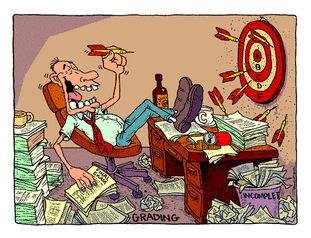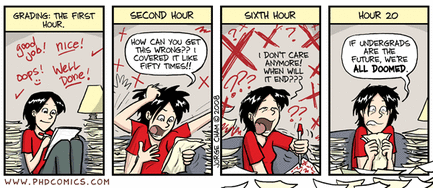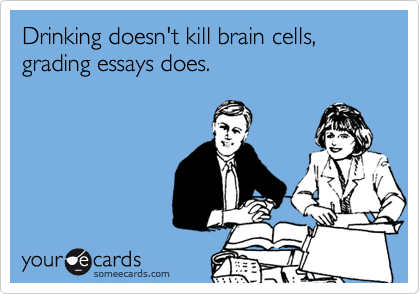 Going into the field of English education, I find that grading writing has to be oe of the most challenging aspects of a teacher's career. There are no classes that offer education majors the opportunity to learn how to grade and what we should expect from a student's performance. It is understood that each teacher has their own specific way to grade writing - whether they become known as the stickler teacher that harshly grades or the teacher that gives an A for any piece of work. I have found that I am not alone in this academic struggle. WPA ListServ scholars also worry about the grading process and how to provide excellent grading that will help students excel in their writing. I don't want to become a teacher that grades in a counterproductive manner. I want to ensure that my students receive grading that will enrich their writing, not hinder it, and find conventional ways to stay static on the way that I grade. In our writing composition senior seminar, we have discussed the importance of the authentic voice in student writing. A plethora of pedagogies aim to encourage student writing, while also aiding students to find their own voice through writing. So my question is, how do we, as teachers, provide grading that will effectively produce better writing?  Fortunately, it seems, that professors of first year writing courses can be fluid in the way that they grade essays. Every semester is a different opportunity to correct past mistakes and create a better way to grade essays. Professor Inoue, from California State University, states, "I think, our job is to set up conditions that allow that exploration to happen, at least in the writing classroom. When WE give grades on individual writing performances, we trick many students into not asking these questions about how to value writing and how they should understand their own writing." Professor Inoue argues that professors need to focus more on creating a conversation with a student about writing to help them understand what it is that they are lacking in their writing. This approach creates an environment where students will understand their writing goals and what they need to target when writing. It also soothes the criticism that may come from grading - it provides an environment of understanding writing and it's importance. This same professor has used a grading system known as "contracts." Although I do not fully understand what a contract for grading is, I assume, from the way he writes about it, that a contract is a standard created for students in the classroom that help them find ways to aim their writing objectives in a manner that will improve their writing, while also targeting the necessities to improve their grades. Many scholars that have commented on the thread geared towards grading essays have provided their own methods when it comes to the grading process, which all prove to work well in their classrooms. In an effort to apply what I have read to my future classroom, I have concluded a couple of key components when it comes to grading: 1) always give feedback and leave time for conversation about how a student may improve their writing 2) contracts or rubrics can assist a student that is struggling with identifying how to write well and 3) grading is a process of trial-and-error; there is no perfect way to grade.
1 Comment
|

Blog493This blog is a reactionary overview of the daily posts to the Writing Program Administrator's listserv. One day; one blogger; lots of reactions. Archives
May 2014
Categories |

 RSS Feed
RSS Feed